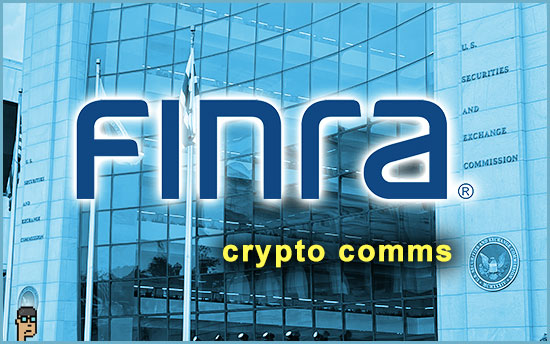SRO on crypto comms
FINRA, the self-regulatory body for securities within the financial industry – and reports into the Securities and Exchange Commission (SEC) – updated its past (November 2022) crypto guidance to members saying this week, “This update does not create new legal or regulatory requirements or new interpretations of existing requirements, nor does it relieve firms of any existing obligations under federal securities laws and regulations. Rather, this update poses questions for firms to consider as they review and supervise their retail communications concerning Crypto Assets.”
The industry body lists off a bulleted list of issues it sees with recent, crypto asset, member communications such as: “Unclear and misleading explanations of how Crypto Assets work and their core features and risks.” FINRA wants its members to do better and, no doubt, is being “encouraged” to do so the SEC. This week’s “update” provides a list of questions for FINRA members to consider before it starts its next crypto asset communications campaign.
Pokemon cards are securities
Yesterday, Politico analyzed the recent court news in the Coinbase and Binance complaints brought by the SEC. A partner at the law firm representing Coinbase – William Savitt at Wachtell Lipton – makes the case for overreach by the regulator saying, “The SEC’s regulatory reach does not go beyond securities… And if it’s permitted to regulate here, it’s permitted to regulate everywhere.” – “everywhere” as in your Pokemon cards says Savitt. Read more.
Senator to Senator
Senator Cynthia Lummis (R, WY) took issue with a recent Senate Banking hearing quote (originally captured by Riot Platforms policy executive Sam Lyman) from Senator Elizabeth Warren (D, MA) alleging that digital assets is rife with money laundering. Sen. Lummis tweeted yesterday, “$900 million in non-crypto (fiat currency) money laundering vs $900,000 in crypto money laundering. Crypto is clearly not the problem. Criminals and bad actors are. It would be a historic mistake to crush an entire emerging industry based on incorrect data.” Read it.
what you should know: Are the “gloves” coming off in the Senate? The Senators are at opposite ends of the digital assets spectrum in DC. It’s the “pro-crypto” Lummis-Gillibrand Responsible Financial Innovation Act [S.2281] versus the “anti-crypto” Digital Assets Anti-Money Laundering Act [S.2669] from Sen. Warren. The two Senators have shown a willingness to work together, though. For example, last year’s National Defense Authorization Amendment on digital assets appeared to be a compromise between the two sides and included the sponsorship of the two Senators.
more mixer comments
Comments continued to flood in to U.S. Treasury regarding it’s proposal for how the Financial Crimes Enforcement Network (FinCEN) will address money laundering concerns with crypto mixers.
Industry continues to express frustration with the proposal.
proposal: “FinCEN Proposes New Regulation to Enhance Transparency in Convertible Virtual Currency Mixing and Combat Terrorist Financing (October 19) – FinCEN.gov
-
- prepared comments form Chamber of Digital Commerce: “…the Chamber is concerned that core elements of FinCEN’s proposal to require reporting of transactions involving ‘CVC mixing’ with a foreign nexus are overbroad, ambiguous, or both. ” More.
- prepared comments form Blockchain Association: ” FinCEN’s failure to consider the many legitimate uses of its targeted class of transactions – ‘CVC mixing’ – makes it impossible for the agency to rationally conclude that the class is of primary money laundering concern…” More.
Read more industry comments here.
hear ye, hear ye
On January 30, House Financial Services Subcommittee on National Security, Illicit Finance, and International Financial Institutions led by Chair Blaine Luetkemeyer (R, MO) will hold a hearing titled, “Better Investment Barriers: Strengthening CCP Sanctions and Exploring Alternatives to Bureaucratic Regimes.” See hearing page.
use case – promissory notes
The Bank of International Settlements announced new projects (or “work programme”) for its Innovation Hub as the bank-for-central-banks experiments with future fintech.
One project is aptly called Project Promissa and gets its fingers dirty with tokenization. The BIS Innovation Hub explains that the project “tests the feasibility of tokenising promissory notes, financial instruments that help fund multilateral development banks and other international financial institutions. In many cases, these are still paper-based. The project will use distributed ledger technology to simplify their management and transparency. It is conducted jointly with the Swiss National Bank and the World Bank Group, with the International Monetary Fund as observer.” See more on Project Promissa.
plain vanilla fraud
In a fraud that yielded over $19 million from investors, the Securities and Exchange Commission (SEC) wants all the money back, and then some, according to a final judgment issued last week. The original complaint filed against Crowd Machine and Metavine and founder Craig Sproule said that the group made “materially false and misleading statements in connection with the unregistered offer and sale of crypto asset securities they referred to as ‘Crowd Machine Compute Tokens’ or ‘CMCTs.'” Read the statement.
still more tips
Senate Banking Chair Sherrod Brown’s (D, OH) illicit finance bill is coming into focus (subscription) – Punchbowl News
Bug That Took Down 8% of Ethereum’s Validators Sparks Worries About Even Bigger Outage – CoinDesk
SEC will ‘apply precedent’ when making decision on spot ether ETFs: Peirce – Blockworks
Grayscale Led the Fight for Bitcoin ETFs. Now Its Fund Is Bleeding Billions. – The Wall Street Journal

